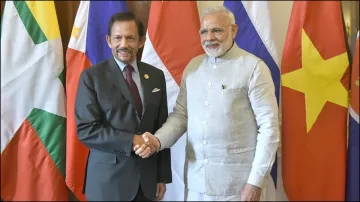From ancient roots to Act East: How PM Modi's historic visit caps off 40 years of India-Brunei ties? EXPLAINED
PM Modi will become the first Indian leader to make a bilateral visit to Brunei Darussalam on Tuesday (September 3). He is expected to engage with the top leadership in bilateral discussions and explore new areas of cooperation apart from defence, trade, energy and space.

PM Modi in Brunei: Prime Minister Narendra Modi has embarked on a 'historic' two-day visit to Brunei, becoming the first Indian leader to make a bilateral visit to the tiny Asian country with a population of just over 4.5 lakh. This is the first stop of PM Modi's two-nation visit, after which he will visit Singapore on September 4 (Wednesday).
"Today, I am embarking on a first-ever bilateral visit to Brunei Darussalam. As we celebrate the 40 years of our diplomatic relations, I look forward to my meetings with His Majesty Sultan Haji Hassanal Bolkiah and other esteemed members of the Royal family to advance our historical relationship to new heights," said PM Modi in a statement before departing for Brunei.
During the visit, the Prime Minister will engage in bilateral discussions on all aspects of our bilateral relations and cooperation with Brunei and also explore new areas for cooperation. India shares a warm and friendly relationship with Brunei and their engagements cover multiple areas such as defence, trade and investment, energy, space, technology, health, capacity building and people-to-people exchanges.
India's ancient linkages with BruneiDespite being a tiny country in Southeast Asia, Brunei Darussalam has historical ties with India that go back to ancient times. Indian High Commissioner to Brunei, Alok Amitabh Dimri, said the Malayan tradition of Brunei derives deep linkages from India - including linguistic, anthropological, ethnic, architectural, religious and traditional norms.
"There are co-traditions where the Indian manner of greeting the namaskar and pranam is the official manner of greeting the His Majesty," he told news agency ANI. Brunei Darussalam was once controlled by a powerful sultanate that extended over to the lower Philippines. It was a power hub of cultural interactions and trade routes and many Indian traders, scholars and seafarers traversed to the region, leaving their mark on Brunei's religion, customs and practices - such as the use of Sanskrit-derived words like 'Dirghayu', 'Srijana' and 'Anugraha'.
As the sultanate became weaker due to wars, piracy and colonisation, Brunei officially became a British protectorate in 1847 after the Sultan signed a treaty with the British Empire. A British Resident was nominated as a representative of the government in Britain to advise the Sultan in 1906. After being briefly occupied by the Japanese during World War II, Brunei was granted an internal self-government in 1959. It gained full independence in 1984 after signing a treaty with the United Nations.
India-Brunei diplomatic relationsIndia and Brunei Darussalam established diplomatic relations on May 10, 1984. The Indian mission in Brunei was established on May 18, 1993. Before this, the Indian Mission in Kuala Lumpur was concurrently accredited to Brunei. The resident High Commission of Brunei Darussalam was established in India on August 12, 1992.
According to the Indian High Commission, Brunei's Sultan Haji Hassanal Bolkiah has been amongst the strongest votary of close relations with India and, has supported and ensured the welfare of the Indian community in Brunei. It is also supportive of India’s ‘Look East Policy’ and ‘Act East Policy’ for expansion and deepening of cooperation with ASEAN.
There have been several high-level visits from both countries, beginning with Sultan Hassanal Bolkiah's first state visit to India in 1992. Former Prime Minister Manmohan Singh was the first Indian leader to visit Brunei when he participated in the 11th ASEAN-India Summit and the 8th EAS Summit on October 9-10, 2013. PM Modi and the Sultan first met on the sidelines of the 25th ASEAN Summit at Nay Pyi Taw, Myanmar in 2014.
Ahead of his visit, PM Modi said Brunei was an important partner in India's Act East Policy and the Indo-Pacific Vision. Brunei's significance stems from its vast petroleum and natural gas fields. It is the third-largest oil producer in Southeast Asia and the fourth-largest of liquefied natural gas. It also has an abundance of rich natural resources.
Brunei is home to about 14,000 Indians wherein the MEA underscored they engaged in noble professions such as doctors and teachers. The MEA said Indians in Brunei have earned goodwill and respect for their contributions to its economy and society. India has also received support from Brunei in space collaboration in the form of three MoUs.
"Defence is another important pillar in our bilateral cooperation. We have an MoU on defence, which was signed in 2016 and has since been renewed in 2021. It provides a framework for our collaboration that covers regular exchanges at high levels, naval and coast guard ship exchange visits, training and joint exercises, and participation in each other's exhibitions. We are also working towards establishing a joint working group for cooperation in the area of defence," said MEA Secretary (East) Jaideep Mazumdar.
ALSO READ | 'Look forward to deepen our...': PM Modi embarks on three-day official visit to Brunei, Singapore